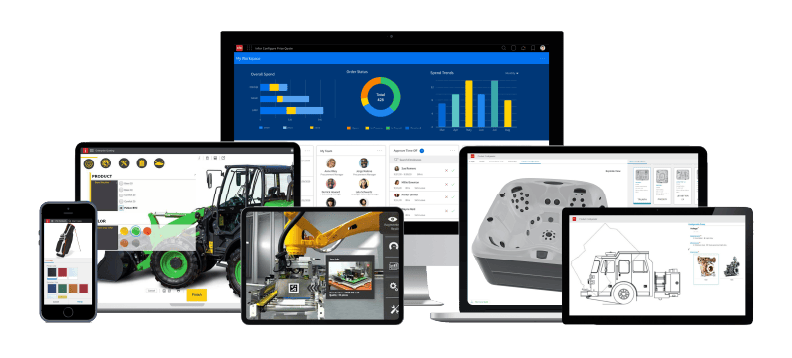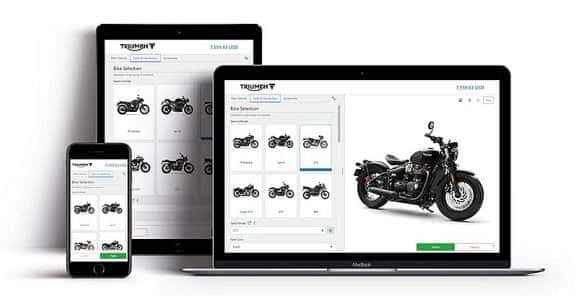What is CPQ (Configure Price Quote)?
CPQ stands for Configure, Price, Quote, and it’s a type of software that helps businesses present customizable options to buyers efficiently, especially when the products are complex or customizable. It’s commonly used in industries like technology, industrial manufacturing, and equipment manufacturing, specialty vehicle manufacturers and where customers may need tailored solutions rather than one-size-fits-all products.
Here’s how CPQ works, step by step:
- Configure: The software helps businesses customize products or services based on the customer’s specific needs. For example, if you’re buying a laptop, CPQ could help you select the right combination of processor, memory, storage, and software options, ensuring everything is compatible.
- Price: Once the product is configured, the CPQ tool automatically calculates the price. It considers factors like discounts, promotions, and customer-specific pricing to ensure accuracy. This removes the need for manual calculations, which can be time-consuming and error-prone.
- Quote: Finally, CPQ generates a professional quote or proposal that the business can share with the customer. This quote is detailed and often includes all the configuration details, pricing breakdown, and terms of the offer.
What Types of Manufacturers Use CPQ Software?
CPQ software is especially valuable for manufacturers that produce complex or customizable products. Here are a few examples:
Industrial Equipment Manufacturers: Companies that build things like machinery, factory equipment, or HVAC systems often need CPQ tools to handle various configuration options (e.g., size, power, features) and create accurate quotes for customers.
Automotive Manufacturers: Car companies or parts suppliers use CPQ to let customers select specific features like engine type, interior materials, or additional upgrades, while ensuring compatibility and accurate pricing.
Electronics and Technology Companies: Manufacturers of products like laptops, servers, or medical devices use CPQ to help customers customize features (e.g., memory, storage, or software packages) and price them correctly.
Furniture Manufacturers: Companies that offer made-to-order furniture or appliances often use CPQ to allow customers to choose materials, colors, sizes, and features while keeping the process efficient and clear.
Specialty Vehicles Manufacturers: Manufacturers that produce custom or specialized vehicles—such as ambulances, fire trucks, buses, or other commercial vehicles—use CPQ to allow customers to select specific features, layouts, or performance capabilities tailored to their needs.
Windows and Door Manufacturers: Companies producing customizable windows and doors—whether for residential, commercial, or industrial use—rely on CPQ to handle different sizes, materials, glass types, colors, and hardware options, ensuring customers receive a product that perfectly matches their needs.
Prefab Home Manufacturers: Businesses selling things like modular buildings, windows, or heavy equipment rely on CPQ to handle the variety of sizes, materials, and add-ons customers might want.
Benefits of CPQ Software
CPQ software offers many benefits for businesses that sell customizable products. It helps save time, reduce costs, and provide a better experience for customers. Here are five key advantages of using a CPQ system:
Faster Sales Process: CPQ software speeds up the time it takes for salespeople to create accurate quotes for customers. What might take hours or days manually can be done in minutes with CPQ. This makes the sales process quicker, allowing sales teams to handle more customers and close deals faster.
Accurate Customization and Pricing: CPQ systems ensure that every product configuration and price is correct. They can instantly show what options are available and calculate accurate pricing, reducing the chance of mistakes or delays caused by checking with other teams. This improves the customer experience by providing clear and reliable information upfront.
Fewer Errors: Manual processes are prone to errors, such as miscommunications, typos, or misunderstandings of what’s possible. With CPQ software, businesses can reduce these mistakes, ensuring that customers only receive options and quotes the company can deliver.
Better Visibility of Options: For complex products, it’s hard for even experienced salespeople to know every option or combination available. CPQ software ensures nothing is overlooked, showing all possible configurations. In some cases, it can even recommend options based on customer preferences or popular choices from other customers.
Valuable Data Insights: CPQ software not only simplifies sales but also collects useful data. It tracks what customers order, when they order it, and what configurations they explore but don’t choose. This information can help businesses improve their sales strategies, forecast demand, and develop better products in the future.
What to Consider When Choosing a CPQ Software
Selecting the right CPQ software for your business is an important decision. Since CPQ systems vary in features and capabilities, here are some key factors to pay attention to:
Ease of Use: The software should be simple and intuitive for your sales team to use. If the tool is too complicated, it may slow down the process rather than speeding it up. A user-friendly interface and easy onboarding process are essential.
Compatibility with Your Products: Make sure the CPQ software can handle the complexity of your products. Whether you offer highly customizable products, multi-level pricing structures, or specific configurations, the software must support these features without limitations.
Integration with Existing Systems: Your CPQ software should work well with your existing tools, such as CRM (e.g., Salesforce CRM, Microsoft CRM, Infor CRM), ERP (Enterprise Resource Planning), or inventory systems. Seamless integration ensures smooth data sharing and avoids disruptions to your workflow.
Customization and Scalability: As your business grows, your needs may change. Look for a CPQ solution that allows for customization and can scale with your business, whether that means adding new product lines or supporting more users.
Speed and Performance: The primary goal of CPQ software is to save time. Ensure the system can process configurations, calculate pricing, and generate quotes quickly, even with complex products or a large catalog.
Mobile and Cloud Capabilities: Many sales teams work on the go. Cloud-based CPQ solutions with mobile functionality allow salespeople to access the system anytime, anywhere, providing more flexibility and improving productivity.
Cost: Understand the total cost of ownership, including licensing fees, setup costs, training, and ongoing maintenance. Choose a solution that provides the best value for your budget without sacrificing critical features.
Vendor Support and Reliability: Look for a provider with a good reputation for customer support. You’ll want a vendor that offers regular updates, technical assistance, and help with setup or troubleshooting when needed.
Reporting and Analytics: A good CPQ system should provide data insights, such as sales trends, customer preferences, and product performance. These analytics can help you make better business decisions over time.
Customer Experience: Ultimately, the CPQ software should make the sales process smoother and more enjoyable for your customers. Consider how the tool will impact your ability to provide accurate, timely, and professional quotes.
Bonus: Before choosing a CPQ software, evaluate your company’s specific needs and challenges. Take advantage of free trials or demos to see how the software performs with your actual data and workflows. Involving both your sales and IT teams in the decision process can help ensure you choose the right tool for your business.













